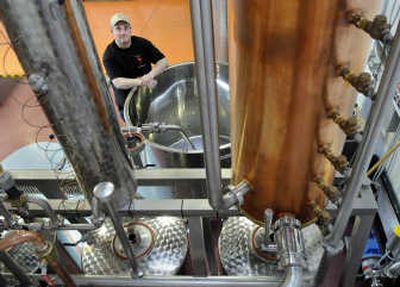Crafting a break: Small distilleries may see lower costs

OLYMPIA – In a state awash in wineries and microbreweries, several Spokane lawmakers want to make it easier for “craft distilleries,” such as the city’s Dry Fly Distilling, to get into the business.
“No one sits around saying, ‘What about micro-distilleries?’ ” said state Sen. Chris Marr, D-Spokane. As a result, the state licensing fee is much larger – $2,000 versus $100 for a microbrewer – and there are tight restrictions on serving and selling the liquor.
The bills would drop the licensing fee for small distillers to $100 and allow on-site tastings and sales. Marr is the primary sponsor of the Senate version; state Rep. Alex Wood, D-Spokane, is pushing a similar measure in the House. Local co-sponsors include state Reps. Don Barlow and Timm Ormsby, both Spokane Democrats.
Dry Fly – which makes small batches of vodka, gin, single-malt whiskey and bourbon – brought the proposal to legislators and asked for their help.
“It’s basically designed to level the playing field” with microbrewers and wineries, said Dry Fly owner Don Poffenroth. He says the small shop is Washington’s first production distillery since 1918.
Dry Fly opened on Trent Avenue last year in a 3,000-square-foot production space with a single 450-liter still. It turns out about 250 12-bottle cases a month, Poffenroth said.
The bills have drawn an unusually broad alliance of co-sponsors, ranging from urban liberals in Seattle and Tacoma to conservatives from agricultural regions like Walla Walla and Sunnyside.
Entrepreneurs in fruit-growing areas are trying to put together startups making apple brandy and other fruit-based spirits, Poffenroth said.
California has about 90 licensed distillers; Oregon has 15, according to the federal Alcohol and Tobacco Tax Trade Bureau. Idaho has several registered distilleries, most linked to Boise-area-based Settle Krick, which does business as Bardenay.
One potential sticking point in the proposal: the bills’ requirement that at least half of the raw ingredients come from Washington. Dry Fly’s vodka, for example, is made with soft winter wheat grown near Fairfield, about 20 miles away.
As things stand now, Poffenroth said, spirits makers can buy 190-proof neutral grain alcohol from industrial manufacturers, cut it with water to 80 proof and call it a Washington state vodka.
“It’s kind of craft distilling’s dirty little secret,” he said.
Hearings are pending on both versions of the bill.